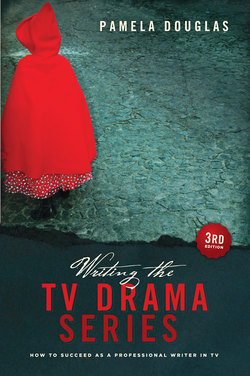Читать книгу Writing the TV Drama Series 3rd edition - Pamela Douglas - Страница 7
На сайте Литреса книга снята с продажи.
ОглавлениеPREFACE TO THE THIRD EDITION
In times of great change, the question is: what remains?
In 2005, when the First Edition of Writing the TV Drama Series was published, the rules of TV were knowable and clear. Hour dramas had four acts with commercial breaks every 13 minutes or so. A network TV season was usually 22 episodes that ran from September to May. And viewers sat on living room couches to watch their TV sets, tuning in to their favorite programs at the times when the programs were scheduled for broadcast.
Back then, I wanted to tell you how to get into this field and do good work once you’re here. That much remains.
By the Second Edition in 2007, many of the rules had changed — but the rules were still clear. On broadcast TV, hour drama shows went to five or six acts; basic cable was offering scripted series that followed traditional paradigms; on premium cable, HBO and Showtime always won the critical awards, and their commercial-free model had become a distinct form of its own. Pilot opportunities for new writers had blown open, but the pilots themselves were written and made the same way they’d always been.
Back then, I wanted to tell you how to use the new rules to write well and succeed. That remains also.
For the Third Edition, I initially thought I’d update the major shows, add a few fresh interviews, and reflect more of what’s happening in alternative forms and on the Internet. But as I researched this edition, I discovered that almost everyone — from showrunners to struggling writers to industry executives to new media creators — were no longer merely adjusting the rules. Now they were asking basic questions: What is television? What is drama? What is a series? What are the delivery options? What are our obligations to the audience? Does a mass audience exist? Even what is reality?
And yet, after the smoke clears, more remains than appeared at first. No matter whom I asked about the future of television, the name of Aristotle, the ancient Greek philosopher, kept being invoked, not only by writers of great drama series, but by someone doing Webisodes and someone else making “Unscripted” shows. Though Aristotle set out the principles of drama thousands of years ago to describe archetypal tragedies in the plays of his time, those essential dramatic principles remain today.
The writer’s skill at storytelling, understanding what drives human beings, the guts to touch the passions, fears and aspirations of viewers, and honestly portray the universal issues of our lives — that content still relies on the art, craft, and insight of people who write.
So this Third Edition will present it all: the traditional basis for writing TV drama juxtaposed with new forms, traditional delivery systems seen in the light of current technology, and interviews with “Guest Speakers” whose ideas diverge from each other more than in past editions. These range from deep social reality that concerns the creator of The Wire, to nuts-and-bolts from a producer of so-called “Reality” shows, and from working writers coping with a shifting marketplace to programming decisions by the President of AMC cable who is part of shifting that marketplace.
In the past I paraphrased All About Eve, advising readers to hold on to their seat belts. But in zero gravity, the challenge is instead to go with the flow as you explore an evolving landscape. In a world afloat, it turns out that the TV drama series is something that does remain.
